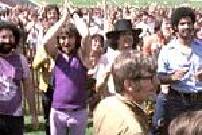|
|
||||
|
|
by Donald Levit  One of those few legitimately recognizable on a first-name basis, Janis is always memorable in filmed performance. It is not to slight the rest of this out-of-the-ordinary documentary, but to get the comment down here at the outset: however good Joplin's other screen appearances, this intimate yet concert version of “Cry Baby” is the most electric song you’ll ever see, by itself worth many ticket prices, as she crescendos on from that patented ad-lib rap. That the other eighty-five minutes of Festival Express is top-drawer unique, too, is not mere afterthought. Too intelligent to distract with seas of waving audience hands or mixing board faders, it captures impromptu jams among relaxed, often zonked icons, interspersed with public performances. Relying only briefly on non-obnoxious, split-screen commentary recorded mostly years later, this record of music and musicians as they are seldom seen, has an unforced, authentic feel of three-and-a-half decades ago. This is July 1970, before fortunes would come their way, and, not quite unanimously, the performers do defend cops, give a thumbs down to crowd violence, and dismiss those M4M (May 4th Movement) people who crashed gates demanding free music in place of $14 tickets. But just disregard one obligatory shot of riot police and a flat, tacked-on reflection on last, lost utopia dreams. For this is an a-historical documentary, no commentary on its time or society. Instead, it celebrates the joy of music, not in Saint Vitus’ possessed listeners but in the very makers of it. Its famous passengers’ faces unwrinkled or marked by age, life on the road and drugs -- Joplin would be dead within two months -- the hardly known five-day rented-train ride, jamming, drinking, talking and detraining at less-than-full venues from Toronto to Calgary, was a cross-musical genre party and chance to schmooze, act silly, play other types and other people’s music, lose sleep and be naturally oneself. Given Canadian law and Canadian Club, hard liquor (with “little gel caps floating around it”) replaced the hard drugs of south of the 49th parallel, with an amusing unscheduled stop right in front of a Unlike the majority of frenzied rockumentaries, here there are no visual gimmicks, even the Dylan-inspired light-through-piled-hair gambit done just right. That the movie even exists, let alone is to be released theatrically, is miracle enough. Peter Biziou’s original seventy-five hours’ worth of negative film lay unproduced and scattered for a quarter-century, victim to disagreements between tour promoters and the principal producer. Reeled work prints were exposed to northern cold and a fire in a garage and even used as hockey goals, until deposited in The organized result is informal, even intimate. This is the filmed fun of music and of musicians enjoying what they do. Most times you look to get finished and offstage, says guitarist John Till, but on the Festival Express train they wanted it to continue forever. Films today generally sin by excessive length, so it is a tribute to Festival Express that one wishes it went on longer than its short ninety minutes. The screening audience was sparse, but we applauded. (Released by ThinkFilm Inc. and rated “R” for some language.) |
||
|
© 2024 - ReelTalk Movie Reviews Website designed by Dot Pitch Studios, LLC |



